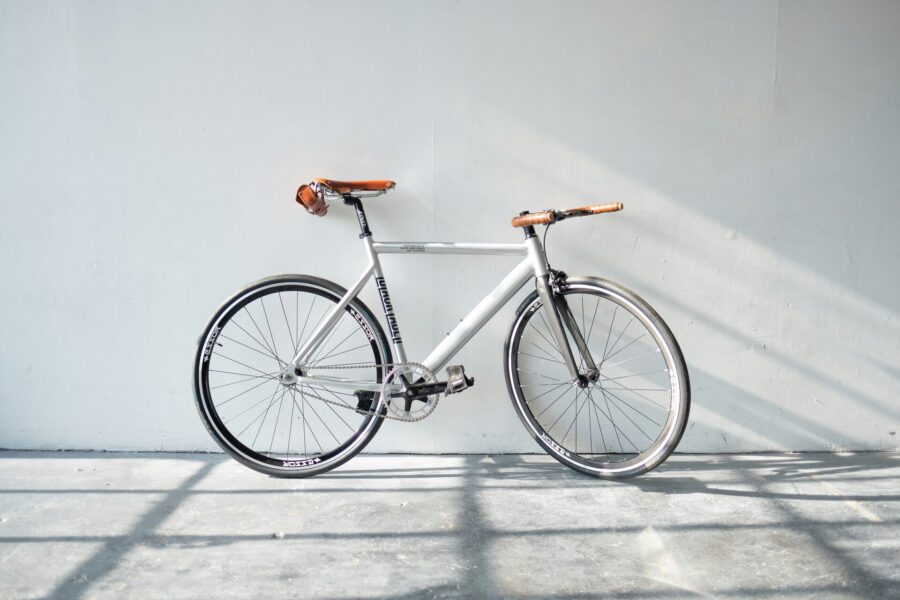Packing for a move isn’t considered easy by any means, but the whole experience can get much easier with the help of bubble wrap. This material will help ensure your possessions safely arrive at a new home and save you time and hassle – but how to use bubble wrap? We have some exceptional tips and tricks to get you started on the right foot, so make sure you follow them.
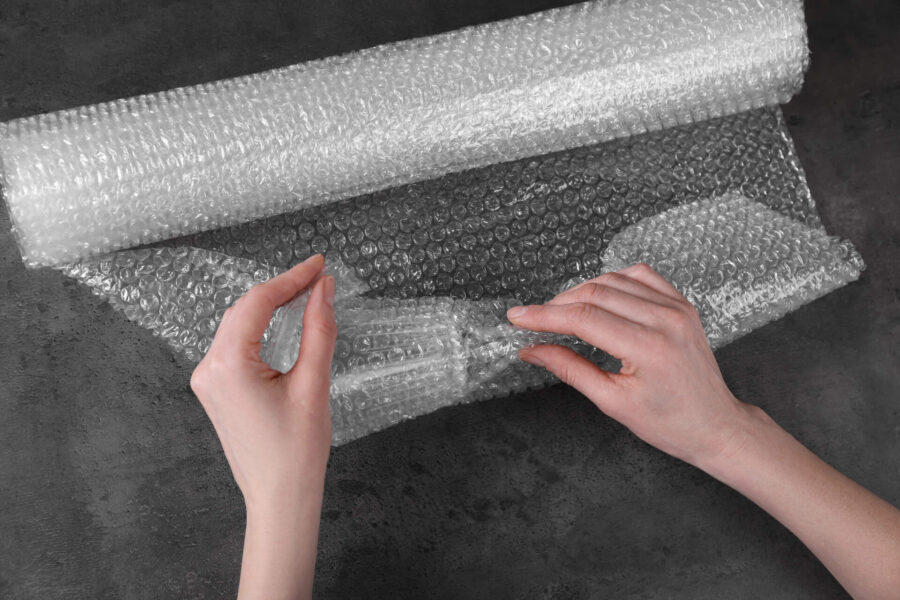
When packing with bubble wrap, you can use a rolling technique so the item is covered with at least two layers of this material, or use a folding method by placing a desired item in the middle of a sheet and covering it. When wrapping an object, ensure that air bubbles are facing inward. Additionally, note that this material can also be used for padding – all you have to do is fill the empty space in the box with it so the objects can stay immobilized.
What Is a Bubble Wrap?
Bubble wrap is a type of packaging material that consists of small air-filled pockets. The bubbles provide cushioning to protect fragile items and are widely used for many different purposes and industries.
However, it’s also one of the relocation essentials when you wish to pack fragile items and other delicate objects when relocating out of state. The air-filled bubbles act as a cushion, absorbing shock and pressure when the package is dropped or experiences impact. Not only that, but these materials can also be used as insulation against moisture and dampness, ensuring that items remain dry during shipping or in storage units (if you decide to get storage services).
In addition to its protective qualities, note that it’s a lightweight material and takes up minimal space in the package, decreasing shipping costs. Even though it’s made out of plastic, it can be reused or recycled, so you can avoid certain more plastic waste than necessary.
Different Types of Bubble Wrap
This type of material can come in different sizes, based on the size of the bubbles, which usually range from 1/4-inch to 1-inch, with the most common dimension being 0.4″. Larger bubbles are used to shield objects from impact, while smaller bubbles typically protect objects from getting scratched.
Let’s take a look at some of the most common bubble wrap types you can purchase after you pick a city to live in and start preparing for a move:
Standard
It features small bubbles that are evenly spaced across the material. This type can be used to provide protection for individual items or to act as a buffer when packing multiple items together in a box.
Large
It is ideal for packing heavier or bulkier items. It has large bubbles in comparison to standard bubble wrap, making it suitable for wrapping around larger items and cushioning them. This type of bubble wrap.
Anti-static
It is designed to protect electronic components and equipment from becoming damaged by static electricity. This type of material has an anti-static coating that dissipates any static charge and can project even the most sensitive of your electronic pieces.
In addition, you can also purchase a bubble roll that usually has pre-cut segments – they can help you save time if you have a last-minute move. This type can offer much-needed convenience and flexibility when relocating to a new city and going through the packaging process.
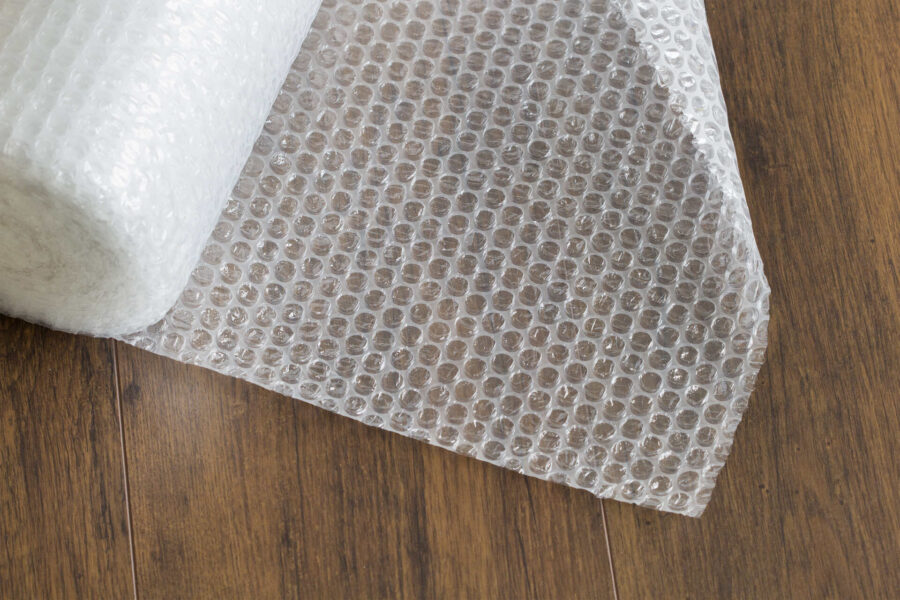
Can You Use Bubble Wrap for Moving?
This material can absolutely be used when relocating – acquiring it is one of the essential parts of relocation day preparations. It is an efficient way to protect items from damage when packing them up for a move. It can help you cushion fragile items such as dishes, glassware, picture frames, and knick-knacks so they don’t get broken by shifting or collisions during the move. It can also be used to fill empty spaces in boxes and containers, so items don’t slide around and get damaged.
In addition to cushioning fragile items, this material can also be used to protect items from moisture damage, as mentioned earlier. It can be especially important if you’re relocating to a colder climate or plan to move in winter or fall – and face a lot of snow or rain. It can help you move furniture, appliances, or even boxes without getting them wet in the process and avoid getting them damaged before you arrive at your new home. This will help keep those items safe during a move, ensuring you arrive at your destination with all of your belongings intact.
Where to Get Bubble Wrap?
Once you decide where to live and start planning a move to another city, you would want to know where to get this material – and there are a few different places you can look. The first place you can look is the local retailer since they carry a variety of sizes, colors, and patterns. Depending on what type of bubble wrap you need, the selection in stores will vary.
You can also order it online through sites such as Amazon or eBay. This is often the best choice for those looking to buy in bulk – just make sure you read reviews before ordering to know what to expect when it arrives. However, don’t forget to browse through websites such as Freecycle, where people post their used goods affordably or even free of charge.
How to Use Bubble Wrap for Packing?
If you don’t plan on getting packing services from your long-distance movers, then packaging all of your household goods will become your responsibility solely. It means that you need to learn how to wrap a picture frame, lamps, mirrors, fragile dishes, and other delicate objects – and you’ll be the most successful at it if you decide to use air bubbles.
Gather the Necessary Supplies
Once you’re ready to start, set up a workspace on a level surface and ensure all the necessary materials are gathered. Of course, if you wish to get long-distance moving services and let professional packers assist you, note that you won’t have to worry about any kind of packaging materials.
However, if you decide to pack on your own, besides air bubbles, you’ll require the following:
- Boxes,
- Tape,
- Scissors,
- Markers.
One of the common long-distance relocation tips concerning packing is to consider using packing paper as well in order to prevent newspapers or plastic from leaving stains on the surface of more valuable objects.
For better protection, make sure you use enough of this material. You need to ensure that everything is completely wrapped, so don’t hesitate to add a few more layers. Your items will still be protected from scratches if you use just one layer, but multiple layers provide much better protection.
Packing Services
Our professional packers have methods and techniques to ensure all your items are intact during and after the move.
Car Shipping Services
We can ship your vehicles using the best freight options available. Your car will be moved safely and securely and arrive as planned.
Storage Services
Looking for storage space while you get settled? California-Seattle Express provides 30 days free storage with your move.
Pack Each Item Individually
The next thing on your to-do list is placing items on a piece of bubble wrap that is long enough to be wrapped around it at least twice. The object should be rolled like a burrito and taped at the ends and at the sides. You can also use a folding method. The object should be positioned in the middle, and you should fold the side of the materials in order to cover the object.
When placing an item inside of a box, note that the bottom of the box should contain heavier objects, and the top should contain lighter, more fragile stuff. Items with unusual shapes could call for a little more work. For instance, a wine glass needs additional cushioning around the stem, which is its weakest spot.
Before sealing each box, you might wish to add more air bubbles (or paper) to act as padding between the wrapped things within. Once you fill the box, seal it carefully and use clear relocating labels, so everyone knows which boxes contain fragile objects.
Make Sure You’re Using the Right Side
When using this material, don’t make the common relocation mistake of turning it on the wrong side. Ensure that the bubbles are facing the item, which means they should always face inward. This is not just great for padding the item. At the same time, it reduces the chances of bubbles breaking and losing their protection abilities. Additionally, it is easier to tape and write labels on a flat surface – air bubbles would make this task much more difficult.
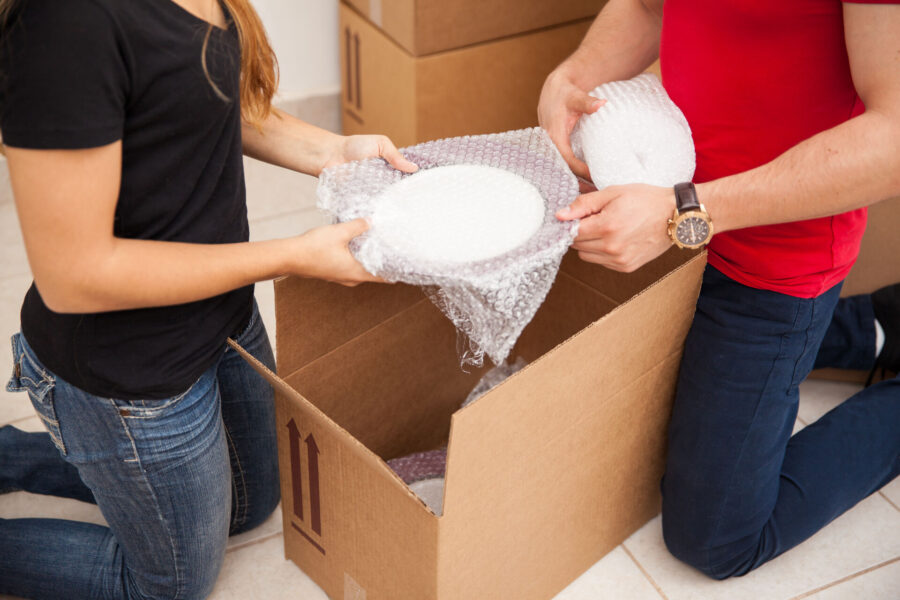
When Not to Use Air Bubbles?
While this material may seem good for protecting different types of furniture during a move, it should not be used on wooden or leather furniture since it can stick to the surface of this kind of furniture and cause damage. This could leave behind residue or even discoloration. Additionally, the plastic material traps heat and humidity against the furniture, which could harm items made of leather. That is why relocation blankets would be a much better choice for these types of goods. These materials are designed to protect without leaving behind any residue or causing damage to the furniture’s surface.
This material is also not recommended for packing electronics such as computers, televisions, and other electronic devices – if it’s not an anti-static type. Instead of bubble wrap, you should use styrofoam or other specialized packaging materials designed specifically for electronic equipment. These materials will provide enough cushioning without causing any damage to the delicate components inside the device.
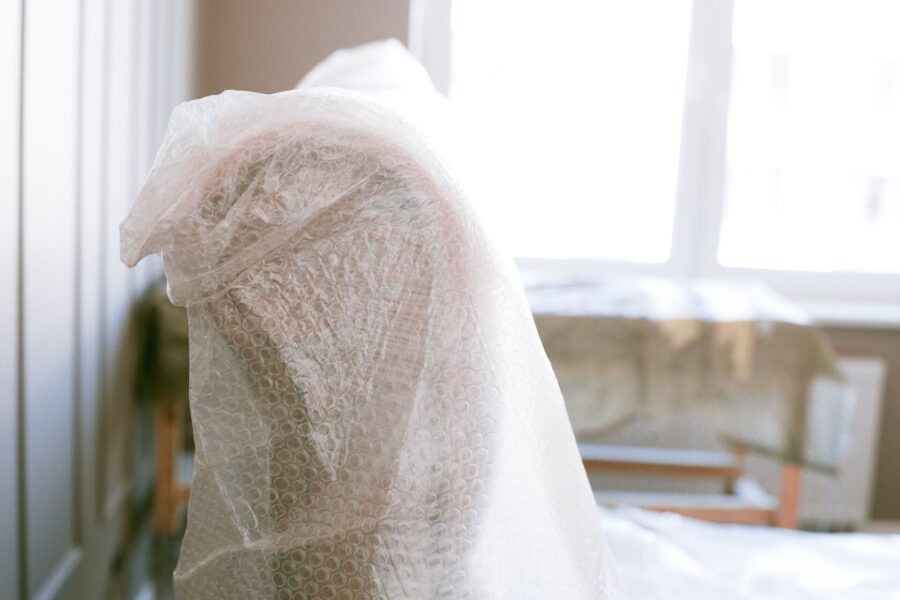
What to Do With This Material After the Move?
Once the workers from a cross-country moving company unload your belongings, it’s time to unpack and settle into your new home. While this material does serve an important purpose during a move, it can quickly become a source of clutter if not dealt with properly, especially if you’re relocating to a smaller home.
While some of the plastic can be used for your own storage purposes and protecting delicate belongings, what should you do with the rest of it? You can choose to recycle (look for bins dedicated to recycling plastic bags), or if the sheets are still usable, you can list them online and gift them to someone who will have a great use for them.
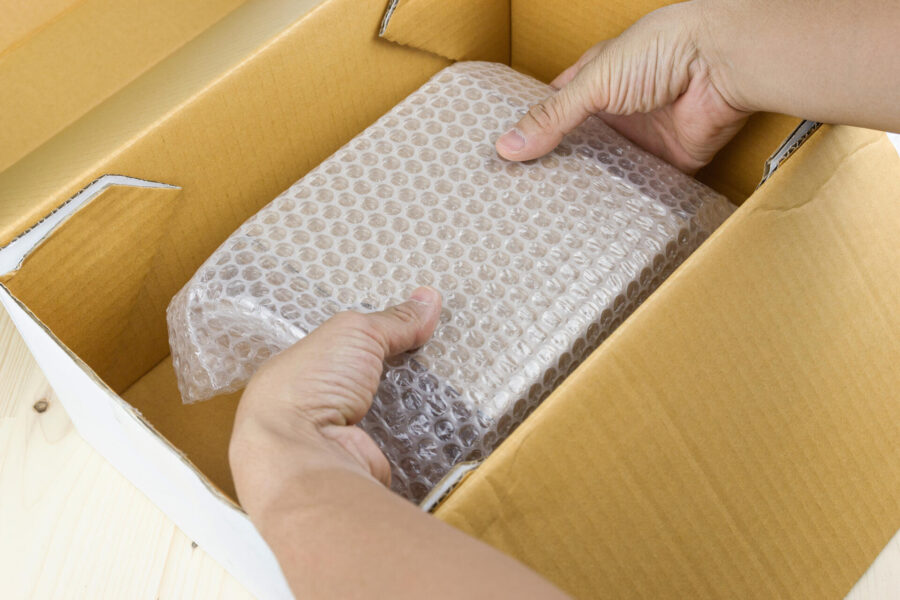
Get Cross-Country Movers to Help You Pack the Most Delicate Belongings
Packing your belongings, especially those fragile ones, requires utmost care if you wish to avoid any damage that might occur during the move. If you deem it demands too much of your time and energy, you should consider hiring movers from Seattle to California (or movers from California to Seattle). Professional packers from a reliable long-distance moving company have all the needed knowledge and years of experience to ensure that all your belongings are packed securely and arrive at your new home safely – use it to move efficiently and as stress-free as possible.



